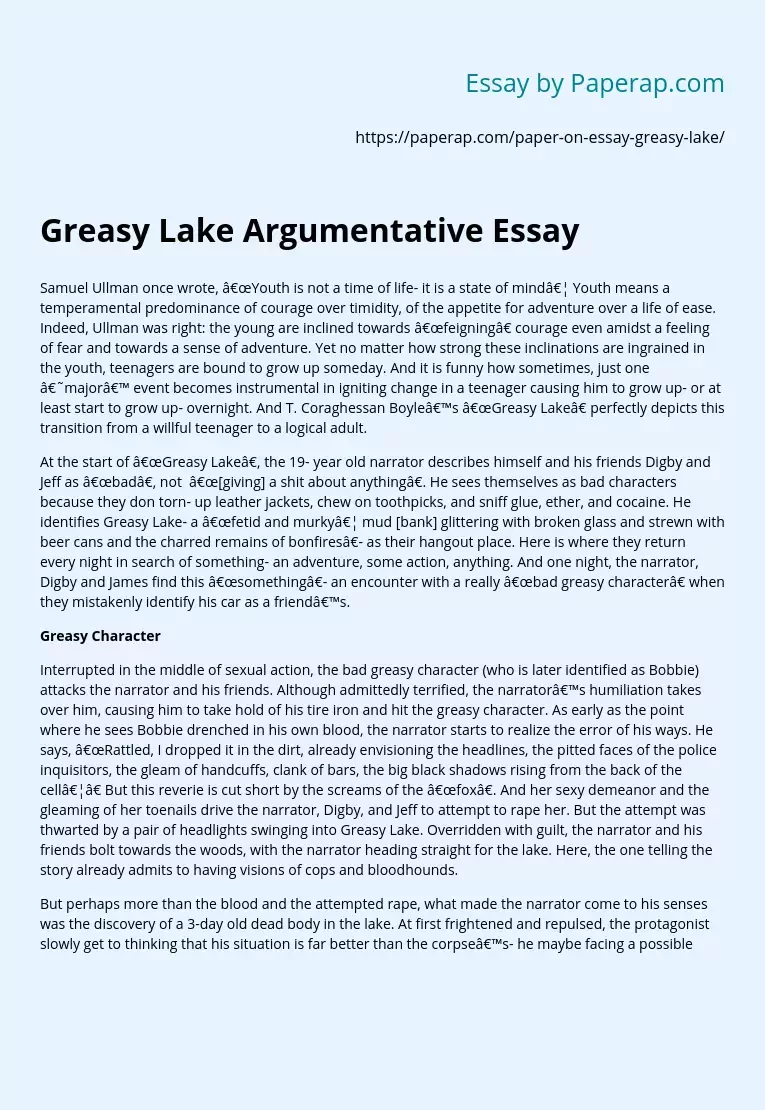Greasy Lake Argumentative Essay
Samuel Ullman once wrote, “Youth is not a time of life- it is a state of mind… Youth means a temperamental predominance of courage over timidity, of the appetite for adventure over a life of ease. Indeed, Ullman was right: the young are inclined towards “feigning” courage even amidst a feeling of fear and towards a sense of adventure. Yet no matter how strong these inclinations are ingrained in the youth, teenagers are bound to grow up someday. And it is funny how sometimes, just one ‘major’ event becomes instrumental in igniting change in a teenager causing him to grow up- or at least start to grow up- overnight.
And T. Coraghessan Boyle’s “Greasy Lake” perfectly depicts this transition from a willful teenager to a logical adult.
At the start of “Greasy Lake”, the 19- year old narrator describes himself and his friends Digby and Jeff as “bad”, not “[giving] a shit about anything”. He sees themselves as bad characters because they don torn- up leather jackets, chew on toothpicks, and sniff glue, ether, and cocaine.
He identifies Greasy Lake- a “fetid and murky… mud [bank] glittering with broken glass and strewn with beer cans and the charred remains of bonfires”- as their hangout place. Here is where they return every night in search of something- an adventure, some action, anything. And one night, the narrator, Digby and James find this “something”- an encounter with a really “bad greasy character” when they mistakenly identify his car as a friend’s.
Greasy Character
Interrupted in the middle of sexual action, the bad greasy character (who is later identified as Bobbie) attacks the narrator and his friends. Although admittedly terrified, the narrator’s humiliation takes over him, causing him to take hold of his tire iron and hit the greasy character. As early as the point where he sees Bobbie drenched in his own blood, the narrator starts to realize the error of his ways. He says, “Rattled, I dropped it in the dirt, already envisioning the headlines, the pitted faces of the police inquisitors, the gleam of handcuffs, clank of bars, the big black shadows rising from the back of the cell…” But this reverie is cut short by the screams of the “fox”. And her sexy demeanor and the gleaming of her toenails drive the narrator, Digby, and Jeff to attempt to rape her. But the attempt was thwarted by a pair of headlights swinging into Greasy Lake. Overridden with guilt, the narrator and his friends bolt towards the woods, with the narrator heading straight for the lake. Here, the one telling the story already admits to having visions of cops and bloodhounds.
But perhaps more than the blood and the attempted rape, what made the narrator come to his senses was the discovery of a 3-day old dead body in the lake. At first frightened and repulsed, the protagonist slowly get to thinking that his situation is far better than the corpse’s- he maybe facing a possible incarceration but he is still breathing and very much alive. Although not directly mentioned, one can infer that it is at this moment of the corpse’s discovery that it finally dawns on the central character that it’s finally time to change his way and that he has a whole life ahead of him to do so.
That one night in Greasy Lake had immense effects on the storyteller. From the teenager seeking excitement in Greasy Lake, the protagonist goes home tired and weary of the now seemingly nonsensical adventures he used to thrive in before. This is apparent in the way he nonchalantly addresses the two girls in “tight jeans, stiletto heels, hair like frozen fur.” With the way he reacted to the “fox” earlier, this new attitude reflects how the whole night transformed the protagonist. Also, the way he already seems uncomfortable being surrounded with reminders of how he was before that night proves that he is shying away from his youthful demeanors.
With “Greasy Lake”, Boyle does well in painting how teenagers grow up through the aid of an unexpected event. And the good thing about the story is that it is not only applicable to the time it was written – it actually spans all generations. “Greasy Lake”, then, is undoubtedly a classic tale of coming-of-age.
Greasy Lake Argumentative Essay. (2019, Dec 05). Retrieved from https://paperap.com/paper-on-essay-greasy-lake/

